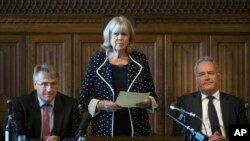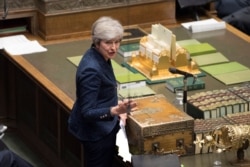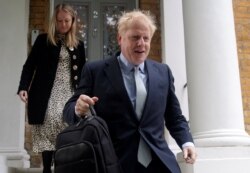Britain's Conservative lawmakers held the first in a series of knockout ballots Thursday to pick a successor for the Brexit-fouled Theresa May as party leader and the country's prime minister — and as predicted, frontrunner Boris Johnson, the former foreign secretary, topped the poll.
Conservative insiders say the race is now his to lose.
Johnson's frontrunner status is all the more remarkable considering that fewer than three years ago, his bid to succeed David Cameron, May's predecessor, as prime minister, crashed when his campaign was sabotaged by a rival.
Slicker presentation and better preparation by Johnson and his team appear to be paying off by securing the backing of 114 of the 313 lawmakers. Jeremy Hunt, the current foreign secretary, came second with 43 votes in a field of nearly a dozen hopefuls.
It will take several weeks to conclude the ballots after a series of votes whittles down the hopefuls to just two contenders. Then the 160,000 or so party members vote for a winner.
May's position was wrecked after she failed to get her Brexit deal approved by the British parliament — the agreement is unpopular with both hardline Brexiters, who say it keeps Britain too closely tied to the European Union, and by Europhiles, who favor greater participation in the EU. May was forced to delay, with reluctant EU agreement, the deadline for Britain to leave the EU, which is now set for October 31.
All the Conservative contenders say if they emerge as the victor, they will renegotiate the contentious Brexit withdrawal agreement Theresa May struck with Brussels last November after two years of ill-tempered haggling.
European national leaders and senior EU officials have maintained for months there can be no renegotiation of the deal signed with May. They do, however, say they would consider amending an accompanying political declaration that outlines Britain's possible future trading relationship, which will be negotiated following Brexit.
They are urging the Conservatives not to try to reopen negotiations.
Irish Prime Minister Leo Varadkar warned midweek against thinking a better accord can be pulled off, saying it would be "a terrible political miscalculation, and "really misunderstands how the EU works."
European Commission President Jean-Claude Juncker said the next British leader has to drop any idea of reopening the Brexit deal. "It has to be respected by whomsoever will be the next British prime minister," Juncker said in Brussels.
May has warned her possible successors they will face the same political impasse she did, as well as a parliament determined to block Britain leaving the European Union without a withdrawal deal, which is designed to reduce economic disruption on both sides of the English Channel.
Few of the candidates appear ready to heed the warnings. Johnson has said he's ready to meet the October 31 Brexit deadline, regardless.
If Johnson is chosen as one of the final two, most observers believe he'll emerge as the winner. The former London mayor is seen as charismatic by many party members and insiders say he passes a "purity test" with his determination to break with the EU.
Aside from the dominating issue of Brexit, the contest has been marked by dirty tricks, personal attacks and lurid accusations with much of the media focusing on whether contenders have ever dabbled in drugs — an issue triggered by the forced confession of one of the principal contenders, former Justice Minister Michael Gove, that he'd snorted cocaine as a student and later as a journalist.
The admission has maimed Gove and left the way open for Foreign Secretary Jeremy Hunt to lay claim to being the only candidate who can seriously challenge Johnson.
Johnson's backers dismiss Hunt as "Theresa May Mark II," (just like the prime minister), but Hunt's aides say his second-place showing Thursday will prompt more lawmakers opposed to Johnson to shift their backing from other candidates, strengthening his challenge.
Uncharacteristically, Johnson has shied away from press appearances, and in the past month granted a single face-to-face media interview, a move his critics say is designed to avoid him wrecking his campaign with trademark colorful indiscretions. "Loose lips sink ships," remarked one his advisers to VOA, invoking a Second World War-era phrase advising against unguarded chatter.
Twenty-four hours before Thursday's balloting, Johnson launched his formal campaign. He kept mainly to a written script framing himself as the only hopeful who can lead the country to Brexit and beat the main opposition Labor Party in a general election and staving off the political challenge of Nigel Farage's newly-formed Brexit Party, which topped the European Parliament elections in Britain last month.
He said if the Conservatives fail to meet the new Brexit deadline, they "will face mortal retribution from the electorate," he added.
As with his party rivals, Johnson hasn't provided any details on how he would overcome the parliamentary majority determined to block Britain leaving without a deal, and how he plans to coax EU leaders to reopen talks.






